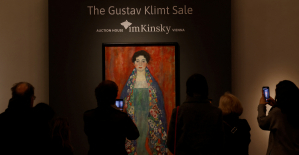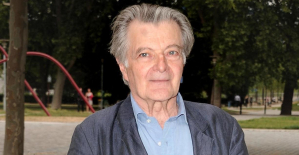Estonia was the first EU country to close its border crossings to tourists from Russia. Since Thursday, Russians are no longer allowed to enter Estonia, even if they have an Estonian Schengen visa. "We let the citizens of an aggressor state peacefully visit the Louvre ... and return to their homeland as if nothing happened," Estonian Foreign Minister Urmas Reinsalu said in an interview with the Politico news portal.
The Estonian travel ban affects around 50,000 Russians and follows an appeal by Ukrainian President Volodymyr Zelenskyy for EU countries to impose a Russian travel ban. While the current ban only applies to visas issued by Estonia itself, the next step is to also deny entry to Russians who have received Schengen visas from other EU countries. Reinsalu calls for an EU-wide entry ban for Russian tourists.
However, the EU is divided on the issue: while countries with painful memories of the time under Soviet rule are pushing for a visa ban, Western European countries such as Germany, France and the Netherlands are against it. Chancellor Olaf Scholz (SPD) said last week that he would not support an EU-wide travel ban for Russian tourists. The conflict in Ukraine is "not the war of Russian citizens," but rather the war of Russian President Vladimir Putin.
Portugal has also spoken out against a ban on tourist visas. Cyprus is also against it. The Mediterranean island has a large Russian-speaking diaspora of around 50,000 people. Before the war, Russians accounted for 25 percent of all tourist arrivals. Greece is also a popular holiday destination for Russian tourists in the summer and is therefore against a ban.
In order to circumvent the applicable flight ban to the EU, the Russians are currently increasingly traveling to Greece via Turkey and Serbia. Air traffic from both countries has doubled this season.
Estonia has gone the furthest so far with its regulation that no more Russian tourists will be allowed into the country. At least Latvia and Lithuania are no longer issuing new tourist visas for Russians. And Finland, which shares Europe's longest border with Russia, will cut the number of processed Russian visa applications by 90 percent starting in September. This measure will have an impact: Most recently, many Russians had switched to the land route via Finland in order to travel to other EU countries.
Poland is considering a similar arrangement as Estonia. The Czech Republic, which currently holds the EU Council Presidency, is in favor of an entry ban, but with gradations. Russian journalists and other civilians who fear persecution should continue to be allowed to enter the EU.
In February, Brussels imposed travel bans on Russians close to the Kremlin - such as government officials and parliamentarians, senior civil servants and military personnel, and some prominent businessmen. The European Commission confirmed that a general entry ban is now being discussed with the aim of a "coordinated approach" in the EU.
At the end of August, the EU foreign ministers are expected to discuss demands for an EU-wide ban at a meeting in Prague. However, a consensus is considered rather unlikely. Unanimity among all 27 member states is required for EU sanctions. Even with the last sanctions packages, resistance had to be overcome, above all from Hungary, which maintains friendly relations with Moscow.
Russian tourists need a Schengen visa to enter 26 EU countries, including Switzerland and Norway. They allow a stay of up to 90 days within six months. Last year, around three million Schengen visas were applied for in the EU – including half a million from Russians alone.

 His body naturally produces alcohol, he is acquitted after a drunk driving conviction
His body naturally produces alcohol, he is acquitted after a drunk driving conviction Who is David Pecker, the first key witness in Donald Trump's trial?
Who is David Pecker, the first key witness in Donald Trump's trial? What does the law on the expulsion of migrants to Rwanda adopted by the British Parliament contain?
What does the law on the expulsion of migrants to Rwanda adopted by the British Parliament contain? The shadow of Chinese espionage hangs over Westminster
The shadow of Chinese espionage hangs over Westminster Parvovirus alert, the “fifth disease” of children which has already caused the death of five babies in 2024
Parvovirus alert, the “fifth disease” of children which has already caused the death of five babies in 2024 Colorectal cancer: what to watch out for in those under 50
Colorectal cancer: what to watch out for in those under 50 H5N1 virus: traces detected in pasteurized milk in the United States
H5N1 virus: traces detected in pasteurized milk in the United States What High Blood Pressure Does to Your Body (And Why It Should Be Treated)
What High Blood Pressure Does to Your Body (And Why It Should Be Treated) “I’m interested in knowing where the money that the State takes from me goes”: Bruno Le Maire’s strange pay slip sparks controversy
“I’m interested in knowing where the money that the State takes from me goes”: Bruno Le Maire’s strange pay slip sparks controversy Despite the lifting of the controllers' strike, massive flight cancellations planned for Thursday, April 25
Despite the lifting of the controllers' strike, massive flight cancellations planned for Thursday, April 25 The right deplores a “dismal agreement” on the end of careers at the SNCF
The right deplores a “dismal agreement” on the end of careers at the SNCF The United States pushes TikTok towards the exit
The United States pushes TikTok towards the exit Saturday is independent bookstore celebration
Saturday is independent bookstore celebration In Paris as in Marseille, the Flames ceremony opens to fans of rap and hip-hop
In Paris as in Marseille, the Flames ceremony opens to fans of rap and hip-hop Sale of the century for a mysterious painting by Klimt, in Austria
Sale of the century for a mysterious painting by Klimt, in Austria Philippe Laudenbach, actor with more than a hundred supporting roles, died at 88
Philippe Laudenbach, actor with more than a hundred supporting roles, died at 88 Skoda Kodiaq 2024: a 'beast' plug-in hybrid SUV
Skoda Kodiaq 2024: a 'beast' plug-in hybrid SUV Tesla launches a new Model Y with 600 km of autonomy at a "more accessible price"
Tesla launches a new Model Y with 600 km of autonomy at a "more accessible price" The 10 best-selling cars in March 2024 in Spain: sales fall due to Easter
The 10 best-selling cars in March 2024 in Spain: sales fall due to Easter A private jet company buys more than 100 flying cars
A private jet company buys more than 100 flying cars This is how housing prices have changed in Spain in the last decade
This is how housing prices have changed in Spain in the last decade The home mortgage firm drops 10% in January and interest soars to 3.46%
The home mortgage firm drops 10% in January and interest soars to 3.46% The jewel of the Rocío de Nagüeles urbanization: a dream villa in Marbella
The jewel of the Rocío de Nagüeles urbanization: a dream villa in Marbella Rental prices grow by 7.3% in February: where does it go up and where does it go down?
Rental prices grow by 7.3% in February: where does it go up and where does it go down? Sale of Biogaran: The Republicans write to Emmanuel Macron
Sale of Biogaran: The Republicans write to Emmanuel Macron Europeans: “All those who claim that we don’t need Europe are liars”, criticizes Bayrou
Europeans: “All those who claim that we don’t need Europe are liars”, criticizes Bayrou With the promise of a “real burst of authority”, Gabriel Attal provokes the ire of the opposition
With the promise of a “real burst of authority”, Gabriel Attal provokes the ire of the opposition Europeans: the schedule of debates to follow between now and June 9
Europeans: the schedule of debates to follow between now and June 9 These French cities that will boycott the World Cup in Qatar
These French cities that will boycott the World Cup in Qatar Montpellier-Nantes: at what time and on which channel to watch the Ligue 1 match?
Montpellier-Nantes: at what time and on which channel to watch the Ligue 1 match? Ligue 1: Luis Enrique leaves many PSG players to rest in Lorient
Ligue 1: Luis Enrique leaves many PSG players to rest in Lorient Football: Deschamps, Drogba, Desailly... Beautiful people with Emmanuel Macron to play with the Variétés
Football: Deschamps, Drogba, Desailly... Beautiful people with Emmanuel Macron to play with the Variétés Football: “the referee was bought”, Guy Roux’s anecdote about a European Cup match… with watches and rubies
Football: “the referee was bought”, Guy Roux’s anecdote about a European Cup match… with watches and rubies


















